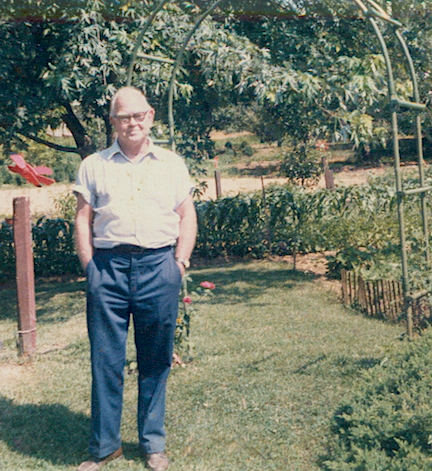A Few of Many Views of a (Possibly) Gentle Man’s Gentle Son
I never expected to memorialize my father
My father’s mother wanted “a gentle man” for a second husband, unlike the first. I don’t know about the first, because he died long before my birth and my father rarely mentioned him. When he did, it would be in reference to my grandfather’s car or to some special, posh dinners out in old Albany, not in reference to wisdom received or the sort of memories you’d expect, no “special moments,” as the pharmaceutical ads might present to us as some sort of universal familial reality.

I know my grandfather reveled in holding firecrackers, exploding firecrackers, in the palm of his hand, and that he spent too much money on a car, a deluxe “racing green” Pierce-Arrow, a point of pride, soon wrecked by a careless friend and, if not leading to, somehow symbolizing, my grandfather’s financial ruin as the country fell into the Great Depression, his three little hat shops closing one after another. When the last of the stores was finally torn away, in the 1950s, they removed the memorials of his own father’s life.
For most of my life, I’d thought my grandfather had died and my widowed grandmother had later remarried. But much later on, I learned that they had divorced, way back then, before hardly anyone divorced, and especially Upstate, I am sure, in an era when everyone associated with a divorce was tainted by it, even including the children, but … I barely knew my grandmother. I’d met her second husband, who most certainly was a gentle man. But maybe my grandfather, my real grandfather, was merely not a “gentleman.” Maybe he was gentle, too, or, at least, not ungentle, that is, gentle enough in his way. Perhaps I misunderstood my father, who was, when I learned these things, slowly dying, unpacking his life only at its close, fading away in the wake of our mother’s death, perhaps remembering to maintain some semblance of himself, of his place, still existing somehow at 96, in this hollow within the larger, open world.
It would be a cruel trick to destroy my unknown grandfather now, no longer held in any living memory, in order to memorialize my father, to attempt understanding of this unshared history and our own difficult relationship. And what a trick anyway to memorialize my father, a man through much of my early life I never expected to memorialize, not from hate or disregard but from disassociation. But luckily, for me, and I hope also for himself, he was humanized in his last faltering years and more so in his very last months.
My father was, like most of us, a fabulist, maybe a bit more with him, though, than with just anyone you might meet in the real world. My mother also had her stories, spun from imagination in large part. Together, they created a safer world, which they sometimes inhabited together, later apart (after their own divorce), and still later, together again, as my father, defined more and more by the limits of his Alzheimer’s, relied on her. So, I don’t know at all, from any source, even an unreliable, fabulist one, whether my grandfather was ungentle (and, perhaps, the source of my father’s reticence about his own past, perhaps the source of my father’s many “troubles”), ungentlemanly, or, merely, not some impossibly unreal “gentleman” of my grandmother’s imagination and desire.
My father, the man I knew, was created, I think, largely by himself, conjured out of something that previously didn’t work. Raised Jewish in small-town New York, bumped two years ahead of his classmates by virtue of his blazing brilliance, then soon after, shipped to the ironically named Pacific, and seeing things there, still a teenager, only shared in his last years, the worst being the freeze-frame view of a Kamikaze pilot smashing into the side of his ship, seeing or imagining perhaps the expression on that pilot’s face, and later, pulling finally into port, the burned-out desolation of Nagasaki.
An isolated child. Just before the war, the conversion to Catholicism, the escape from an arranged marriage with the zoftig proto-hausfrau and the expected place in the family hat shop. After the war, damaged (perhaps, but who could say), expatriatism in France, re-created as a Parisian intellectual and scholar, but still, and forever, small town, paranoid, worried always about Hitler, “riots,” “the end times,” and so much more.
Demanding tribute, expounding endlessly, logorrheic, fabulating Truths from thin air. Maybe too much indulgence — or too little? Too much interior living? Who knows? He probably didn’t, but who can say that about themselves, let alone others? And now he’s gone and can’t tell me, even if he did ever know, and even if he’d wanted to share it. Which I don’t think he would have.
I didn’t know my father. Neither of us knew the other, or ourselves. Still, I need to memorialize whoever, fact or fiction, he was. And, after all, he was my father.

Copyright © 2023 by Chris Sumberg. All rights reserved. Chris Sumberg’s writing has been published in Museum of Americana, Portland Monthly, The Partially Examined Life, and other magazines. His novella/self-help hybrid, 500k/MO!! as EPIC-POET! by Vincent “Vinnie The Weasel” Vulpikonek, was published in 2022. He and his wife, Mary Pat, live outside of Knoxville.


